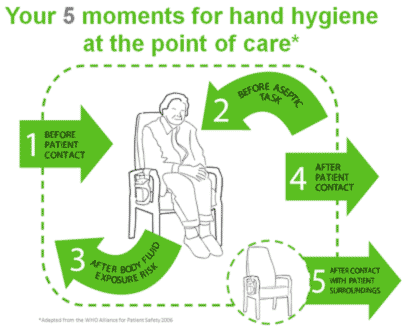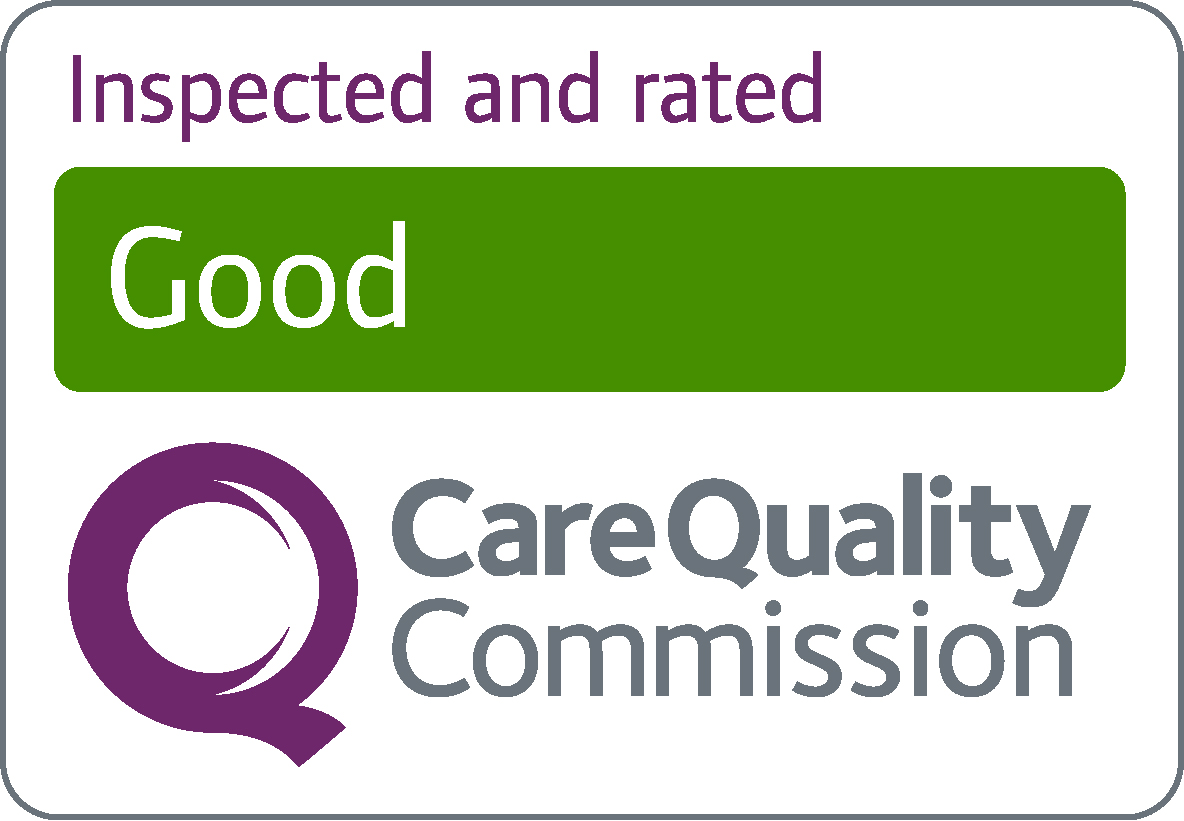The Infection Prevention team provide a comprehensive infection prevention service across identified healthcare establishments in Wolverhampton.
Our Vision
Our Vision is that no person is harmed by a preventable infection.
Mission Statement
The Infection Prevention team will inform, promote and sustain expert infection prevention policy and practice in the pursuit of patient or service user and staff safety wherever care is delivered.
Strategic Aims
We will:- Lead, shape and inform the infection prevention agenda, locally, nationally and internationally.
- Influence and promote the evidenced base for infection prevention practice.
- Be the organisation of choice for all those involved in infection prevention to sustain improvements in practice
How You Can Help Prevent Infection
How can patients and visitors help?
As you enter the Acute Hospital you will see signage advising you of your role in PREVENTING infection. The information is designed to keep you and our patients safe. Please take a moment to read the signage. It is placed at car parking booths and key entrances.
Clean your hands
The best ways of preventing bacteria passing from one person to another is by cleaning our hands. There are hand gel dispensers at the entrance to every ward and we ask that anyone entering the department uses it. To use the hand gel place a squirt of the gel onto the palm of one hand then rub hands vigorously together covering all areas of your hands and fingers. Keep rubbing your hands together until the gel evaporates. This takes 20-30 seconds.
Hand washing with soap and water is also very important. Remember to wash your hands:- After going to the toilet
- Before eating or drinking
- Before handling medication
Staff must clean their hands before having contact with patients.
The Trust use Five Moments for Hand Hygiene to train staff effectively. This is a World Health Organisation (WHO, 2006) initiative designed at promoting global hand hygiene.

Outbreaks
Outbreaks of diarrhoea and vomiting often circulate in the winter months. It is important that patients are protected whenever possible from the winter vomiting virus entering the hospital through visitors. If you have had symptoms of vomiting or diarrhoea, do not visit until you have been better for 48 hours.
Influenza
In the winter months Catch it, Kill it, Bin it. Remember, please use a tissue and dispose of it safely in a bin and wash your hands regularly. Please comply with visiting times. During outbreaks, visiting may be restricted to prevent spread.
If you have had flu you will remain infectious for up to 1 week from the day you started to feel unwell, to reduce the risk of spreading the virus in hospital wards please do not visit until this time has passed.
General Advice
- Some bacteria survive in the skin scales that we shed and beds are the place we are most likely to shed them. These bacteria can be picked up by your skin or clothing and transferred to you.
- Visitors should use benches/chairs provided for visitors rather than sitting on the beds.
- Please remember to wash your hands and use the hand gel on entering and leaving the ward.
- While you are visiting at the hospital please do not use the patient toilet facilities. There are separate toilets for visitors.
- Please help us keep our hospitals clean and tidy.
- Dispose of waste (for example used tissues or sweet wrappers) in the waste bins provided.
- We do not support food being brought in from home. However, we do recognise that this does happen. Please note that we cannot reheat any foods not prepared in the hospital nor share them with other patients
Patient Information
- It is important if you have a cold or flu like symptoms to remember your respiratory hygiene. Catch it, kill it, bin it. Remember, please use a tissue and dispose of it safely in a bin and wash your hands regularly.
- Please remember to use the hand wipes provided before eating meals.
- Patients should avoid sitting on beds belonging to other patients.
- If you are an inpatient please do not share toiletries.
- If you have any wound dressings, stitches, drips or catheters try not to touch them unnecessarily.
- It is important that care is taken when these devices are touched as they offer bacteria a direct route past your skin.
- Limit the amount of personal belongings that are brought into hospital. Storage on the wards is limited and it becomes difficult to clean the area if it is cluttered.
- Please help us keep our hospitals clean and tidy.
- We do not support food being brought in from home. However, we do recognise that this does happen. Please note that we cannot reheat any foods not prepared in the hospital nor share them with other patients.
How do we care for patients with infections?
Sometimes it is necessary to care for patients using extra precautions. This may be if you have a confirmed or suspected infection or are prone to infections. This could involve you being moved to a room of your own. Staff may need to wear aprons and gloves when they are caring for you. It is rare that visitors are required to take extra precautions but this should be checked with the staff looking after you.
If you have any questions about your care then please ask the staff on the ward who are looking after you.
How do we know who has MRSA?
The Royal Wolverhampton NHS Trust screens for MRSA in accordance with Department of Health Guidelines. This is for two reasons. The first is to ensure that patients being admitted from home or other care settings can be identified and treated quickly to prevent themselves from developing an infection (e.g. in a surgical wound or catheter). If you fall into one of the identified groups then a swab will be taken from your nose, armpit and groin as well as any wounds you may already have. These are the common places on the skin where MRSA is found. You will have these swabs taken by the nursing staff when you are admitted.
Patients are screened if they are going to undergo a procedure where it is important that an MRSA infection does not occur. Swabs will be taken from the nose, arm-pit, groin and any wounds as above. If you attend the pre-operative admission clinic on Appleby Suite these will be taken for you there. If you are admitted straight to the ward, or are already in hospital, the nursing staff on the ward will take the swabs for you.
Please be reassured that the swabs do not hurt and are important to protect you and other patients from acquiring an infection with MRSA.
If you would like to know if you will be screened for MRSA when you come into the hospital please ask a member of staff on the ward or department (e.g. Appleby Suite, outpatients or a ward).
What do we do if an outbreak of an infectious condition is suspected?
The Infection Prevention team has close links with the UK Health Security Agency (UKHSA) which helps to monitor levels of infectious conditions and share information nationally and within our local area. The Infection Prevention team provides comprehensive advice and support to care homes in Wolverhampton during outbreaks. Partnership working and sharing of information locally enables outbreaks to be managed effectively.
The Royal Wolverhampton NHS Trust treats all incidents and outbreaks seriously, an outbreak in hospital may need only two patients to be identified with some conditions. Outbreaks and incidents are reported within the hospital and there are systems in place to help us to learn from these, to improve and plan for their future management.
Outbreaks occur in both hospital and community settings, most commonly viral gastroenteritis and flu type illnesses, and the spread of these is difficult to prevent. To limit spread within the hospital it is sometimes necessary to close wards to new admissions and delay discharges. This helps to prevent further spread of the infection into care settings within the community. One of the key ways of preventing spread is not to visit the hospital if you are feeling unwell with symptoms of diarrhoea or vomiting. The outbreak notification and management plan for care homes supports effective management and is designed to prevent unnecessary admissions to the hospital during outbreaks of diarrhoea and vomiting.
If you are a patient or visitor and are in an area affected by an outbreak you will be informed by staff when you next visit or may see signs informing you of extra precautions you need to take.
It is important that if you are unwell you refrain from visiting where possible, particularly if you have any of the following conditions:- diarrhoea or vomiting illness
- Colds and flu like illness
- Chicken Pox, undiagnosed rashes
The Trust takes the prevention and control of healthcare associated infection (HCAI) very seriously. The Trust is committed to the promotion of good infection prevention practices, however we realise this can only be achieved if all members of the team play their part. This team includes anyone who works in the Trust, particularly those who work in patient areas. We also believe that patients and visitors can play an important part in the prevention and control of infection.
What should I do if I have any concerns about infection prevention and control or cleaning?
We encourage patients and visitors to raise any concerns that they have as they arise. Please speak to the nurse/midwife in charge of the ward or department where you have the concern.
Infection Prevention Annual Report
Infection Prevention Annual Report 2022/23
If you require reports prior to the latest report, please contact the Communications Team at rwh-tr.CommunicationsDept@nhs.net.

